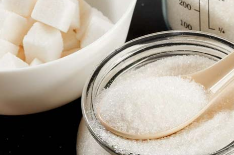Allulose – The Rising Sweetener in South Korea
Allulose is gaining traction in South Korea. It is a potential competitor to traditional sugar substitutes like stevia. Local influencers and major food companies are embracing this sweetener. Allulose is naturally found in fruits such as figs and kiwis. Regulatory bodies in both the U.S. and South Korea have approved its use.
Availability and Cost
In South Korea, allulose is widely available in supermarkets. A 700 ml bottle costs less than 10,000 won (approximately $7.26). Despite being four times more expensive than table sugar, its popularity is growing. Consumers appreciate its taste, which is similar to that of table sugar. Allulose is reported to be 70% as sweet as sugar. It is almost calorie-free, making it appealing to those seeking healthier alternatives. Influencers highlight its taste as an important advantage over other sweeteners.
Health Benefits and Concerns
Health experts acknowledge some benefits of allulose. It may aid in weight loss and is beneficial for individuals with diabetes. When combined with sucrose, it can lower blood glucose responses. However, experts caution that more research is needed on its long-term health effects.
Market Growth and Production
Samyang Corp reports important growth in allulose sales. They sell over 1,000 metric tons annually, with double-digit growth since 2020. In 2022, their business-to-business revenue surpassed 10 billion won. They recently opened a factory capable of producing 13,000 tons of allulose per year. The global market for allulose is projected to exceed $500 million by 2030. This is an increase from around $310 million in 2023. In comparison, the stevia market was valued at over $514 million in 2023.
Regulatory Challenges
Despite its popularity, allulose faces regulatory hurdles. The European Union and Canada classify it as a “novel food,” requiring further safety assessment. The World Health Organization has issued guidelines against using non-sugar sweeteners for weight control, citing potential long-term risks.
Side Effects and Consumer Awareness
Possible side effects of allulose include gastrointestinal distress, such as bloating and diarrhoea, particularly in large quantities. Samyang acknowledges the challenge of making allulose affordable while increasing consumer awareness. They believe in its future potential as a sweetening agent.
Important Facts for Exams:
- Allulose: Allulose is a sweetener found in fruits like figs and kiwis. It is 70% as sweet as sugar and almost calorie-free. It has gained popularity in South Korea.
- WHO Guidelines: The World Health Organization issued guidelines against non-sugar sweeteners for weight control. These guidelines cite potential long-term health risks associated with their use.
Month: Current Affairs - November, 2024
Category: Science & Technology Current Affairs


